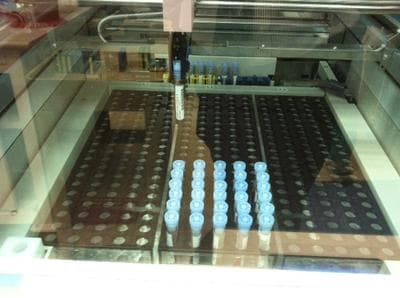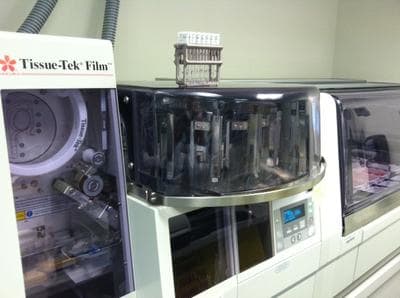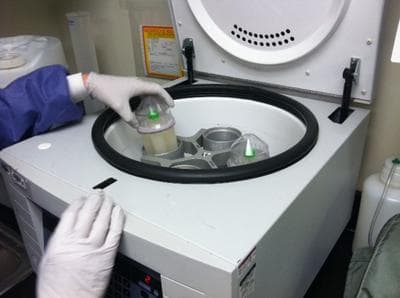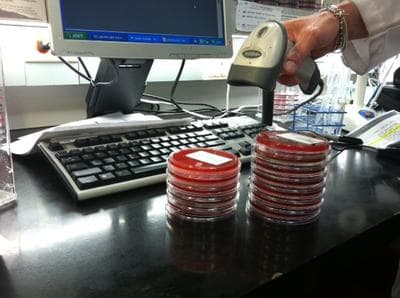Advertisement
Inside The Lab: Sights And Sounds Of Your Health Issues
Mine is a world very few see: pathology and laboratory medicine. More than 70 percent of the information in your medical record comes from laboratory testing. Yet chances are you've never been inside the lab that so influences your health care.
So I'd like to offer you a little behind-the-scenes tour of some of the sights and sounds of the top health issues facing the United States. They're fascinating in and of themselves, but they also may give you added incentive to do what it takes for your own health.

Heart Disease
Heart disease kills more Americans than anything else, accounting for 1 in 4 deaths. Heart disease alone costs the U.S. $108.9 billion each year. Prevention is our best defense (hence the recent fuss over new statin recommendations). This begins with knowing your lipids. Seen and heard here are the sounds of automated instruments analyzing specimens to report a lipid panel.

What is a lipid panel? It includes cholesterol, LDL (low density lipoprotein, “bad cholesterol”), HDL (high density lipoprotein, “good cholesterol”) and triglycerides.

Cancer
Ranking number two in leading causes of death is cancer. Screening exams such as pap smears, colonoscopies and mammograms are vital to early detection and prevention. Once again, the pathology lab plays an integral role. Below, hear and see how tissue slides are produced and evaluated by pathologists. All care begins with a diagnosis. See your physician for what screening tests are recommended for you.

Time is everything when dealing with stroke, the third-ranking cause of death. Seconds can make the difference between life and death. As the clock ticks away, the likelihood mounts of irreversible neurologic consequences. The lab is just one of the many critical members in the care team when treating stroke patients. The speed with which specimens are received, processed and resulted is extremely important. The arrival of a stroke patient in the Emergency Department sets off a rapid, carefully choreographed, series of events.
Seen and heard here are STAT specimens arriving through the pneumatic tube system for immediate workup.

Diabetes
The American Diabetes Association estimates 25.8 million children and adults in the United States — 8.3 percent of the population — have diabetes. Of those, 7 million are undiagnosed and an additional 79 million have pre-diabetes.
What can you do? It’s simple. Know your fasting blood sugar and if you have diabetes, the hemoglobin A1c is extremely important to monitor. Your physician will typically order these tests as part of a routine checkup. When that sample is received in the lab, it is first centrifuged before being analyzed on automated instruments.

This illustrates how the lab plays an important role not only in your care, but in the care of whole populations. By monitoring the care of entire communities, your health care team can detect problems before they become problems. This keeps patients out of the hospital and saves the system money. Pre-diabetes is a perfect example. Ask your doctor to be tested if you have risk factors for diabetes .
Infectious Disease
Prior to the discovery of penicillin in 1928, bacterial infections were by far the number one cause of death. Infections still remain a major danger. Whether it be hospital acquired infections (pneumonia, C. diff.), the rise of antibiotic resistant bugs (MRSA) or influenza, the microbiology lab is important in identifying these important pathogens.
Listen and see how culture plates are scanned and evaluated for germs. Flu remains a killer. What can you do? Get immunized.

In Defense Of Pathology

As you can see, the pathology lab plays a critical role in your health, and it offers insights into very real perils. Following these simple steps can help keep you healthy and out of the hospital.
Now, a brief message in defense of pathology: Federal health financing authorities have proposed devastating cuts to pathology, with up to 80 percent cutbacks in some services. These would threaten the very existence of many labs and most certainly impact the quality of care you receive.
Massachusetts U.S. Rep. Joseph Kennedy was one of the first to sign on to a bipartisan letter in the House opposing these cuts. Sens. Warren and Markey have joined in a similar Senate letter.
In order for health care reform to succeed we need to ensure that we have the resources to continue to deliver high quality care.
Dr. Michael Misialek is Associate Chair of Pathology at Newton-Wellesley Hospital and Assistant Clinical Professor of Pathology at Tufts University School of Medicine.
This program aired on November 18, 2013. The audio for this program is not available.